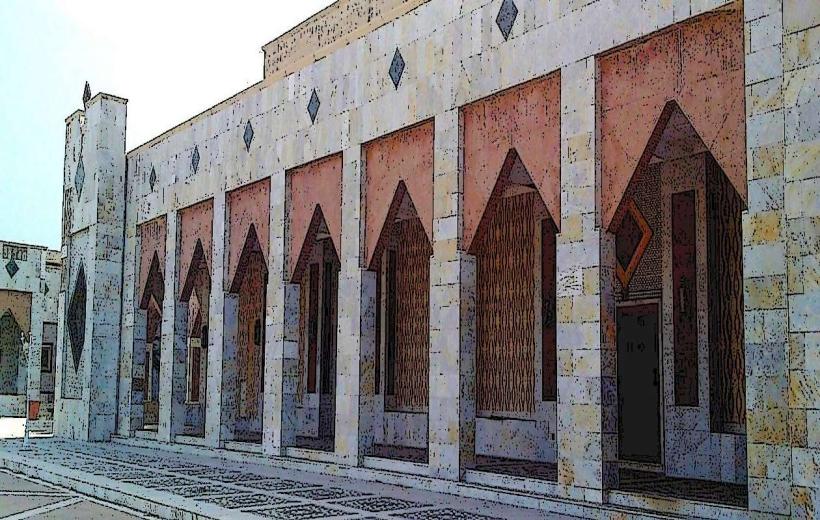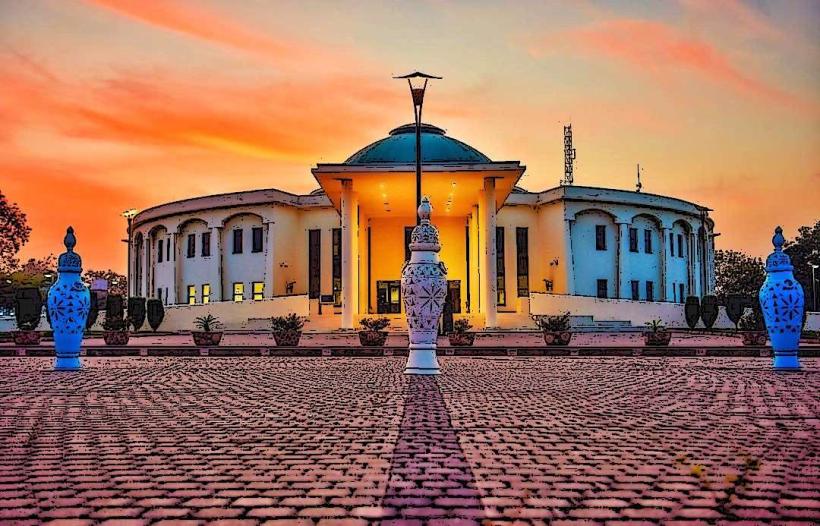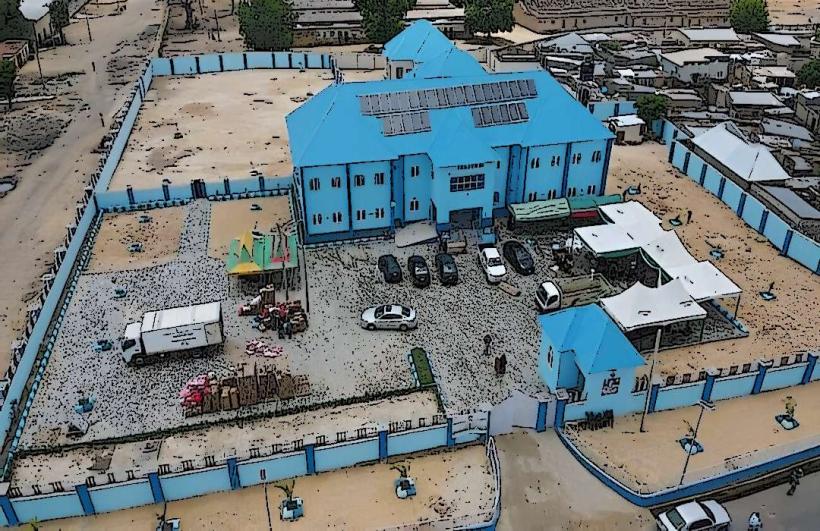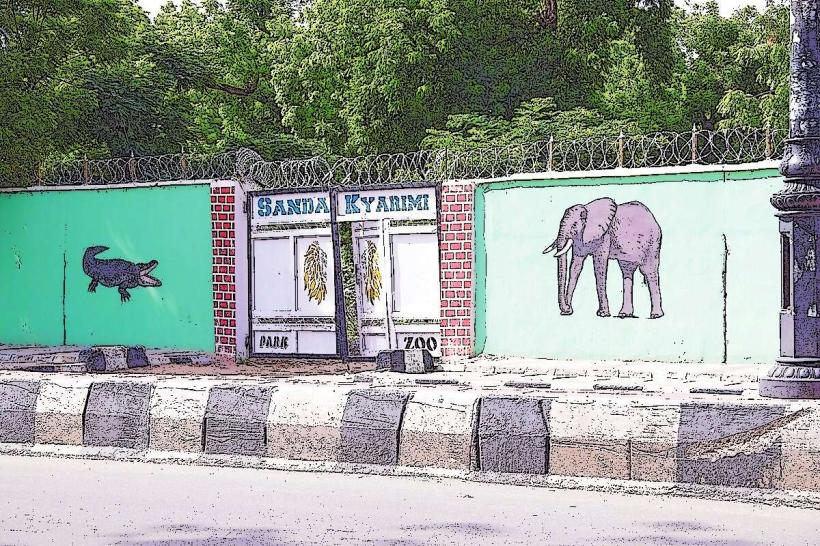Information
Landmark: Maiduguri Central MosqueCity: Maiduguri
Country: Nigeria
Continent: Africa
Maiduguri Central Mosque, Maiduguri, Nigeria, Africa
The Maiduguri Central Mosque is one of the most iconic and significant mosques in Maiduguri, the capital of Borno State in northeastern Nigeria. This mosque plays a central role in the religious and cultural life of the region, serving as a focal point for both Islamic worship and community engagement.
Historical Background
The Maiduguri Central Mosque's history dates back to 1918, when the original structure was built to serve as the main place of worship for the Muslim population of Maiduguri. The mosque was closely associated with the Shehu of Borno, the traditional ruler of the region, who would often lead prayers during important religious events. However, the mosque began to deteriorate over time, and by the 1980s, it was clear that the building needed to be replaced.
In 1986, a decision was made to demolish the old mosque and construct a new, larger facility to accommodate the growing population of Maiduguri. The project faced numerous delays, primarily due to funding issues and the unstable political climate at the time. Despite efforts to complete the mosque, the project remained unfinished for over 30 years.
The mosque's reconstruction was given renewed focus under the administration of Governor Kashim Shettima, who prioritized completing the mosque in 2015. After years of dedicated work, the Maiduguri Central Mosque was finally completed and officially commissioned on February 8, 2019, by the Sultan of Sokoto, Muhammad Sa’ad Abubakar III, alongside 20 other emirs.
Architectural Features
The Maiduguri Central Mosque combines traditional and modern Islamic architectural styles, making it a visually striking structure.
Prayer Hall: The mosque features a spacious prayer hall capable of accommodating thousands of worshippers. The hall is beautifully designed with intricate Islamic calligraphy and geometric patterns that reflect the rich cultural heritage of the region.
Minarets: The mosque is crowned with several minarets, which rise majestically above the city skyline. These minarets are used to call the faithful to prayer and are a significant feature of the mosque's design.
Domes: Large domes are a hallmark of Islamic architecture, and the Maiduguri Central Mosque includes multiple domes, each decorated with patterns that are both functional and aesthetically pleasing.
Courtyard: The mosque's open-air courtyard provides additional space for worshippers during the Jumu'ah (Friday prayers) and during the Eid prayers when large crowds gather. The courtyard allows for a smooth flow of people during these busy occasions.
Ablution Areas: The mosque is equipped with numerous ablution points for the convenience of worshippers. This is essential for Islamic practices, as washing before prayers is a key ritual.
Libraries and Learning Centers: The mosque houses educational facilities, including 10 classrooms dedicated to Islamic studies and two libraries containing books on Islamic theology, history, and law. The presence of these resources underscores the mosque’s role as a center for Islamic learning and scholarship.
Media and Administrative Facilities: There is a media center for disseminating religious content and administrative offices for managing the mosque’s activities.
Power and Utilities: Recognizing the need for reliable utilities, the mosque is equipped with two standby generators and water reservoirs to ensure uninterrupted services.
Cultural and Religious Importance
The Maiduguri Central Mosque is much more than just a place of worship. It is a cultural hub and a key institution for the Islamic community in Maiduguri and Borno State. Here are some of the important roles the mosque plays:
Jumu'ah Prayers: The mosque hosts weekly Jumu'ah prayers, which attract thousands of worshippers every Friday. This prayer session is one of the most significant weekly events for Muslims, and the Maiduguri Central Mosque serves as a central gathering point for the community.
Eid Prayers: The mosque also holds Eid al-Fitr and Eid al-Adha prayers, attended by tens of thousands of worshippers. These prayers are a symbol of the unity of the Muslim community in the region.
Islamic Education: As a hub for Islamic learning, the mosque runs educational programs for young Muslims. The 10 classrooms serve as venues for Qur’anic studies, Islamic jurisprudence (fiqh), and the teaching of Hadith (sayings of the Prophet Muhammad). It also has a special emphasis on memorizing the Qur'an.
Community Engagement: The mosque is involved in various community welfare programs, including organizing religious lectures, social outreach, and charity work. It plays a central role in addressing the spiritual needs of the people of Maiduguri.
Traditional and Religious Leadership: The Shehu of Borno, the traditional ruler, often leads the mosque’s major religious events, including Eid prayers. This highlights the role of the mosque as a symbol of both spiritual and political leadership in the region.
Challenges
Despite its grandeur and significance, the Maiduguri Central Mosque faces challenges that are primarily linked to the broader security situation in northeastern Nigeria, particularly because of the ongoing Boko Haram insurgency.
Security Concerns: Over the years, Maiduguri and the surrounding region have been affected by Boko Haram insurgency, which has led to heightened security measures. The mosque itself has been a target of extremist attacks, and there are ongoing concerns regarding the safety of worshippers during large gatherings.
Limited Resources: Although the mosque has many modern features, there are still gaps in its maintenance and expansion. Limited resources for ongoing maintenance and expansion of the facilities could affect the long-term sustainability of the mosque's services.
Conclusion
The Maiduguri Central Mosque stands as a symbol of resilience for the people of Maiduguri and Borno State. Its architectural beauty, historical significance, and spiritual importance make it a central institution in the region. While facing challenges, particularly in relation to security, the mosque remains a beacon of Islamic faith, culture, and education in northeastern Nigeria. Its completion after decades of work serves as a testament to the perseverance of the local population and the commitment of the government to provide a lasting religious and cultural heritage for future generations.





